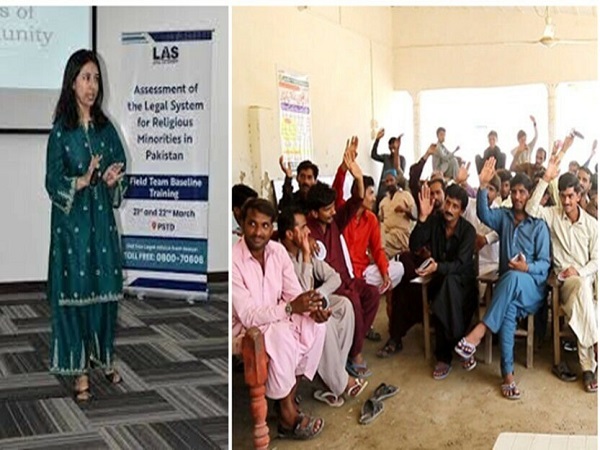Freedom of religion and belief is a universally recognized fundamental right, enshrined in numerous international legislative instruments, including the Universal Declaration of Human Rights, International Covenant on Civil and Political Rights, and Declaration on the Elimination of All Forms of Intolerance and Discrimination Based on Religion or Belief.
Pakistan, as a responsible member of the international community, has committed to ensuring freedom of religion and belief within its domestic jurisdiction by ratifying key international instruments and embodying these principles in its constitution and other domestic legislation.
Despite these legal guarantees, discrimination and bias against members of religious minorities persist in Pakistan.
The presumption is that such discrimination and bias arise from the attitudes and behaviour of those in decision-making and positions of power and influence.
In order to analyse the extent of such discrimination, the Legal Aid Society conducted evidence-based research with administrative and justice sector actors in Pakistan.
This article discusses the research, key findings, and the way forward.
The Knowledge, Attitude, and Practices (KAP) survey was conducted in 10 districts of Sindh with 165 Muslim members of the administration and justice sector actors.
These include members from criminal and civil administration, ombudsperson, and judiciary.
A mixed method approach was employed for this study, using four primary methods, including an expansive literature review and a close-ended survey conducted with all participants, followed by in-person discussions and observations of the respondents.
The research study indicates three significant findings. First is a lack of knowledge of specific laws and processes related to RMCs.
For instance, the legislative assemblies of Pakistan have enacted Personal Laws in accordance with the religious injunctions of religious communities, which regulate matters related to marriage, divorce, custody, etc.
The administrative and justice sector actors pass through extensive training and capacity building to be able to practice the correct application of law and to ensure the implementation of laws enacted by assemblies.
To perform their responsibilities, these individuals must be well-equipped with the laws and procedures of the country.
Therefore, the lack of knowledge of the personal laws of religious minorities negatively affects the rights of these communities, and they are deprived of their legal protections.
Secondly, the study found an inclination and preference for Islamic laws, principles, and beliefs to govern the personal lives and choices of religious minorities.
Pakistan's constitution guarantees equal protection to minorities, and the Sharia principles are not applicable to non-Muslims.
Therefore, in Pakistan, Muslims are governed under the principles of Sharia, while religious minorities have their own set of religiously defined personal laws.
Despite this, many participants in the study made constant, specific, and undue references to Islam and Islamic law. Many expressed a preference for the use of Islamic laws and principles and considered it sufficient to provide protection and rights to religious minorities.
Thirdly, the study indicated a sense of "otherization" of religious minority communities, characterized by the use of "us" vs. "them" rhetoric.
Muslim justice sector and administrative actors consider religious minorities as an out-group while adjudicating their legal matters. A few responses hinted at a sense of superiority over minority communities.
For example, when asked about separate dining areas for Muslims and non-Muslims at workplaces, an alarming percentage of respondents answered in the affirmative.
Due to this bias and sense of superiority, members of religious minorities face hurdles while accessing justice in Pakistan.
The findings of the research report are concerning and indicate pervasive issues in the justice system of Pakistan with regard to religious minorities.
Therefore, it is imperative to undertake measures to address these lacunas in the system.
The Legal Aid Society is working to address these issues and has undertaken numerous initiatives.
To bridge the knowledge gap about personal laws, the Religious Minority Project of the Legal Aid Society has prepared three Information, Education, and Communication (IEC) materials related to the personal laws of Hindu, Christian, and Parsi communities to create awareness about their personal laws.
LAS also conducted seven policy dialogues in different districts of Sindh and a national-level conference, "Access to Justice Conference", in Islamabad to share findings of the research study with relevant stakeholders, including members of National and Provincial Assemblies, members of the legal fraternity, human rights activists, minority rights representatives, civil society organization, media, etc.
LAS has also trained paralegals from minority communities to create awareness about the legal rights of religious minorities.
It plans to develop sustainable mechanisms by developing collaboration between paralegals and district peace committee members.
LAS will also train relevant criminal and civil justice sector actors to address the lacunas identified in the research study.
We hope these measures will positively contribute to easy access to justice in Pakistan and ensure that members of religious minorities are entitled to the same rights and opportunities in the country.
LAS also looks forward to working with government and civil society organizations for the rights of religious minorities.
Source: SAMAA0 COMMENTS



